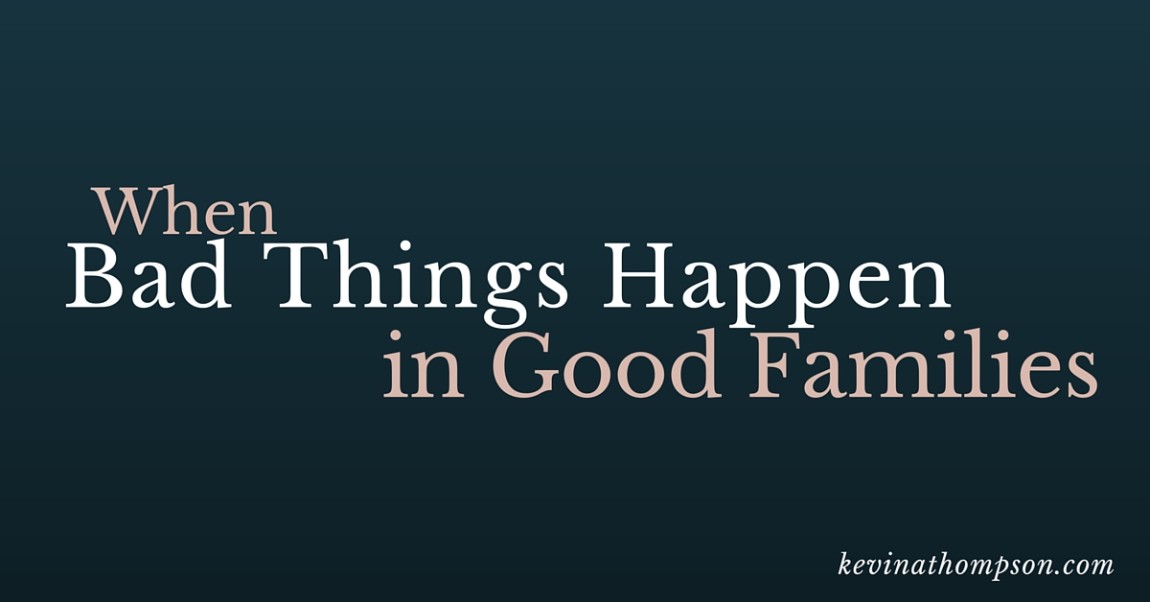The difference between a good family and a bad family is not the presence or absence of bad things. It’s how those bad things are handled.
Sometimes bad things happen in good families:
- a parent gets laid off
- a teenager gets arrested
- a marriage dissolves
- an adult child rebels
- an affair happens
- the family name appears in a negative headline
Bad things don’t just happen in bad families. Despite good choices, hard work, right priorities, and a long tenure of good parenting and strong relationships, bad things can happen.
But when bad things happen, good families handle them in a radically different way than bad families.
3 Things Good Families Do that Bad Families Don’t:
1. They confront it instead of denying it. The temptation when something bad happens is to cover it up. In many families, problems are never discussed, issues are never confronted, and Aunt Edna’s drinking problem or Cousin John’s very public mistake is never discussed. Mention it at Thanksgiving dinner and the entire family glares at you as though you have broken the most sacred of rules. (See: I Know Who is in Charge of Your Family)
In good families, issues are discussed. They don’t dominate family outings. They aren’t publicly broadcasted for everyone to hear. But they are confronted. Feelings are expressed. Opinions are heard. Apologies are given. Each family member feels heard and understood about their perspective on the situation. Conversations are had and issues are put to rest rather than forever lingering.
2. They separate it instead of being consumed by it. While healthy families confront tough issues, they aren’t defined by them. They can separate themselves from others in the family. A mistake by one doesn’t dictate the reputation of everyone. They can help the other person without becoming so enmeshed with the situation that it consumes every aspect of the family. (See: What a Child’s Mistake Reveals About a Parent)
In bad families the situation isn’t discussed, but the family is consumed by it. They fixate on the problem, worry about it, and feel owned by it. If one member of the family is in a bad spot, everyone is expected to feel the emotional weight of their pain or shame. Healthy families can care while still respecting individual boundaries and identities.
3. They move forward instead of being paralyzed by it. Because they can talk about it and because they aren’t defined by it, healthy families can move forward when a bad thing happens. They can process the issue and create a new way of life. When an ugly divorce happens in a family where every marriage stays together, they can grieve the loss but figure out how to deal with the stress and demands of a separated family. While they honor traditions, they can change what has always been done for the holidays or birthdays because they know life demands adaption and change. (See: Healthy Families Can Talk About Everything)
When bad things happen in unhealthy families, everyone tends to get stuck in the situation. Years can pass and nothing changes. I have interacted with families and found out the family secret, assuming it happened the previous month only to learn it happened a decade earlier. It still feels fresh because the family is stuck in the situation. Unable to process the problem, they are paralyzed in inaction. Good families move forward. Life may not return to normal, but they create a new normal making the best out of bad situations.
While bad families might experience more negative experiences because unhealthy patterns beget unhealthy behaviors, bad things don’t only happen in bad families. Good families have bad experiences as well. However, they handle them in radically different ways. By confronting it, discussing it, and dealing with it, they can move forward.
Bad things will happen to (and in) your family. Handle them properly.
For more, see:




3 Responses to When Bad Things Happen in Good Families